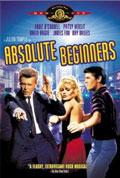
Directed by
Julien Temple
107 minutes
Rated PG
Reviewed by
Bernard Hemingway

Absolute Beginners
Based on a novel by Colin MacInnes, one of a trilogy about London life, Absolute Beginners, a hyperbolic imagining of London's West End in the summer of 1958, is on every level probably the most overstuffed and frenetic musical you are ever likely to see. Known as the director of the Sex Pistols documentary, The Great Rock N Roll Swindle (1980), Temple’s main calling card both before and after this film (which, unsurprisingly, bombed critically and commercially) is as an A-list director of music videos for artists like The Rolling Stones, Depeche Mode, Whitney Houston, The Kinks, Van Halen and David Bowie (who provided the songs for this film on the condition that he played the part of a slick businessman), to name just a few.
Temple's MTV clientele suggest that he must be very good at what he does but this, his feature film debut, comes across as more a compendium of stylistically incongruent production numbers than a story told in words and song.
Eddie O'Connell plays a pop scene photographer, Colin, who loves Suzette (Patsy Kensit). She drops him to marry couturier and property developer, Henley of Mayfair (James Fox). Henley is in partnership with various dodgy entrepreneurs including Vendice Partners (Bowie) who use white supremacists oicks to get rid of the Indians and blacks in Colin's crummy but vibrant neighbourhood.
Absolute Beginners portrays the changing face of England in the late 1950s as war-time rationing was lifted, England moved to near full employment and teenagers emerged as a red-hot presence in the new consumer economy. While their parents bought TVs, cars and washing machines, the kids spent their disposable income on records and clothes.
For those who can bring some knowledge of the era (Lennon and McCartney would have been Colin's contemporaries) the film should have some rewards. A good deal of credit must go to the art direction by Stuart Rose and Ken Wheatley as well as John Beard’s fabulous production design that gives us delightful moments like Ray Davies' doll's house style production number "A Quiet Life" and Bowie performing one of his songs on a giant typewriter. British chanteuse, Sade appears, as do Fine Young Cannibals, but the overall lack of narrative focus and wont of appealing characters (neither O'Connell or Kensit are strong enough in the leads) gives us little to engage with.
One can't help but wish that Baz Lurhman had taken it on.
Want something different?





